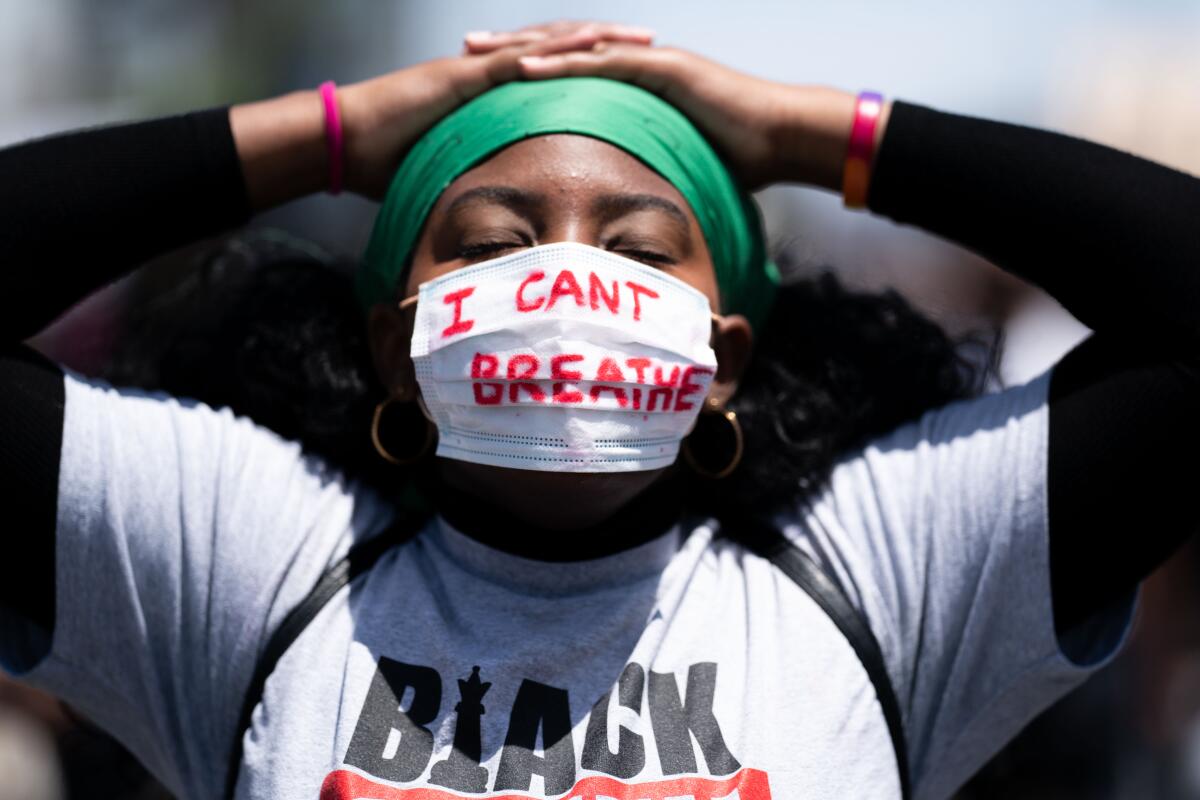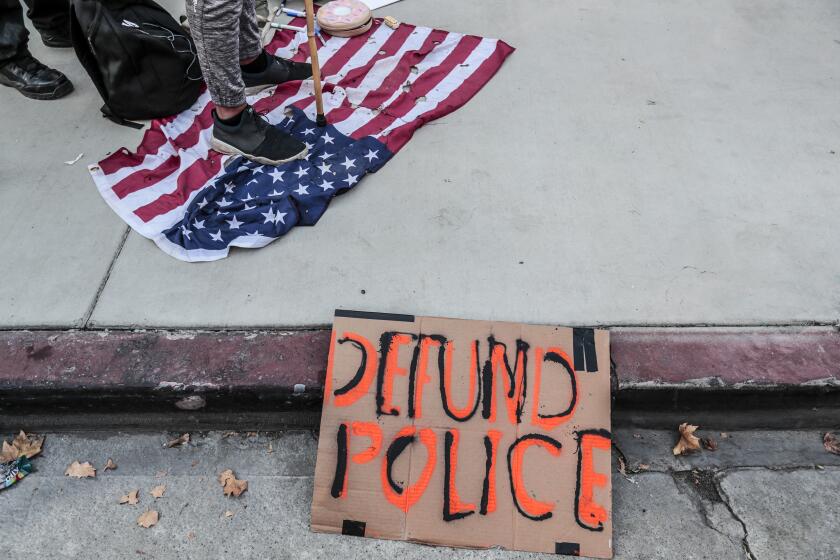Measure J, L.A. County’s 2020 criminal justice reform measure, is constitutional, appellate court finds

- Share via
An appellate court has ruled that a sweeping Los Angeles County criminal justice reform initiative known as Measure J is constitutional, potentially paving the way for millions of dollars to be invested in social services and a host of community-based jail diversion programs.
A three-judge panel of the state’s 2nd District Court of Appeal on Friday reversed an L.A. County Superior Court judge’s ruling in 2021 that struck down the voter-approved initiative.
Measure J requires that 10% of locally generated, unrestricted L.A. County money — estimated between $360 million and $900 million — be spent on social services, including housing, mental health treatment and other jail diversion programs. The county is prohibited from spending the money on the carceral system — prisons, jails or law enforcement agencies.
Measure J was a landmark moment in L.A. County politics when the powerful Board of Supervisors acted on what community activists had been pleading with the board to do for years: reallocate how county money is spent to disrupt the county’s reliance on its jails to house those with serious mental illnesses and people who committed low-level crimes in response to poverty or addiction.
The supervisors voted in July 2020 to place Measure J on the ballot when those pleas were amplified, and made politically safer to address, after a national outcry over the murder of George Floyd in Minnesota and similar killings of unarmed Black people by law enforcement.
About 2.2 million L.A. County voters, representing 57% of the ballots cast, approved the November 2020 ballot measure. However, the following December, a coalition of county unions (and two private residents) demanded in court that Measure J be stopped, arguing “the voters lacked constitutional and statutory authority to require the Board and County officers to take specific budget actions,” according to court records.
A Superior Court judge declares that Measure J, which Los Angeles County voters approved last year to set aside public funds for social services, is unconstitutional.
The opposition group was essentially led by the Assn. for Los Angeles Deputy Sheriffs, a union representing sheriff‘s deputies, which had spent more than $3.5 million on advertising on TV and social media to fight Measure J.
In June 2021, L.A. County Superior Court Judge Mary H. Strobel ruled in favor of the unions, holding that Measure J was unconstitutional because it improperly restricted how the L.A. County Board of Supervisors could spend county money.
“The only question presented is whether the ballot process can be used to take this budgeting choice out of the hands of the current and future elected boards,” Strobel wrote in her proposed ruling in June 2021. “The court concludes it cannot.”
But, on Friday, the 2nd District Court of Appeal reversed Strobel’s decision, holding that the California Constitution allows counties to implement such budgeting strategies into their charters. (Not all California counties have charters, but L.A. County is one, meaning it has some self-governing power allowed through its charter.)
Measure J “neither impairs the exercise of essential government functions nor violates state law,” the appellate court held. “Measure J thus is enforceable.”
Friday’s news brought much celebration from community activists who spent hundreds of hours lobbying the Board of Supervisors for change.
The measure would require that 10% of county funds be spent on social services such as housing and jail diversion programs. The county would be prohibited from using the money on prisons, jails or law enforcement agencies.
L.A. City Councilmember Eunisses Hernandez, who co-chaired the Re-Imagine L.A. County campaign, was cheering and overwhelmed with joy when called for comment.
“This is a win that a lot of us have been waiting for, and it’s so powerful because it reaffirms this vision,” Hernandez said. “Communities want ... our dollars to go to care, and I think when we talk about public safety, Measure J was our response to what we think public safety is and what it should look like.”
Derek Hsieh, executive director of the Assn. for Los Angeles Deputy Sheriffs, said his organization is disappointed with Friday’s court decision, and its attorneys will analyze the ruling to determine the organization’s next steps in fighting Measure J.
Board of Supervisors Chair Janice Hahn said in a statement that “the voters of L.A. County made it clear they want us to spend more money keeping people out of jail, and this appeals court has upheld their wishes.”
It remains unclear how Measure J will affect the county’s budget, including the Sheriff’s Department. After Measure J was struck down, the Board of Supervisors committed to budgeting exactly as Measure J called for. The supervisors created the Care First Community Investment fund and have allocated about $400 million to it over the last few years.
Measure J opponents previously argued these types of funding cuts would harm public safety and cause crime rates to rise.
Hsieh said it’s hard to discern whether those funding changes have affected the L.A. County Sheriff’s Department in part because the agency remains deeply understaffed with deputies working hundreds of hours in overtime. The supervisors have failed to train and hire new deputies, he said.
“With the increasing criminal issues within L.A. County and the coming of the Olympics and other significant events, I don’t think the supervisors are going to have a choice but grow the department’s academies,” Hsieh said.
Megan Castillo, who serves on the fund’s advisory committee, said the county must commit more.
Since the beginnings of Measure J, the county chief executive officer and community activists have been at odds over how much money should be allocated for Measure J. The county CEO originally estimated that $360 million would be allocated for Measure J, while activists argued that number was closer to $900 million.
Castillo, Re-Imagine LA Coalition coordinator, said if the supervisors want to follow the full spirit of Measure J, they will allocate more to address the county’s under- and disinvestment in BIPOC communities that’s led to over-policing and generational trauma.
“This is a major victory for the people,” said Castillo, policy and advocacy manager at nonprofit La Defensa. “The law enforcement special interest groups tried to use the judicial system to circumvent change for L.A. County residents because they fear the power of the people, and I think this (ruling) is a testament that says Measure J is truly here to stay.”
Times staff writers Alene Tchekmedyian and Keri Blakinger contributed to this report.
More to Read
Sign up for Essential California
The most important California stories and recommendations in your inbox every morning.
You may occasionally receive promotional content from the Los Angeles Times.












